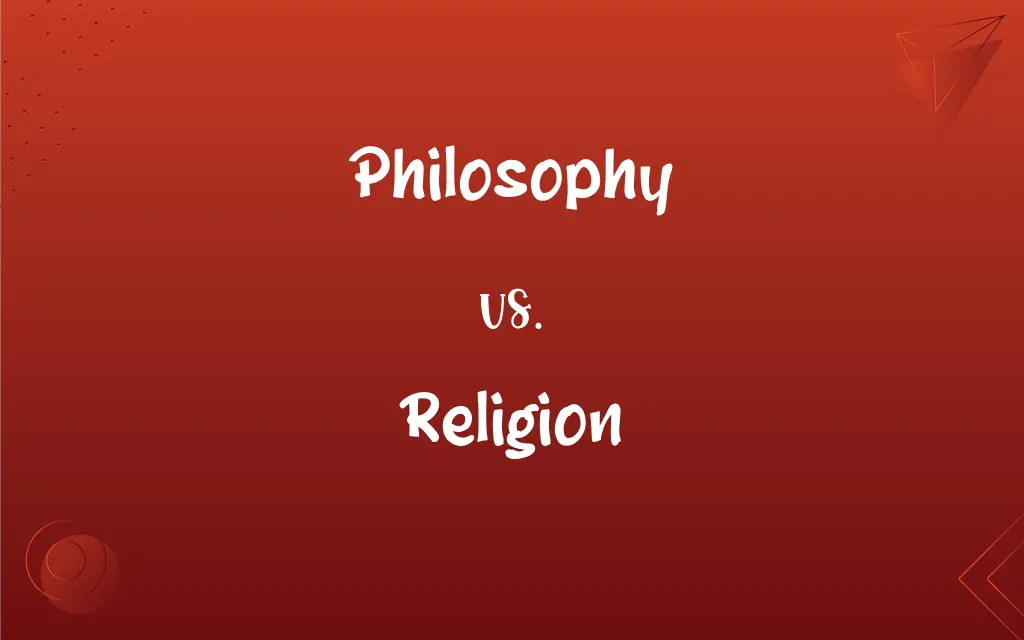Philosophy vs. Religion: What's the Difference?
Edited by Aimie Carlson || By Janet White || Published on January 18, 2024
Philosophy is the study of fundamental nature of knowledge, reality, and existence using reason and argument, while religion involves beliefs, practices, and rituals related to the divine or sacred.

Key Differences
Philosophy is a discipline that uses critical reasoning and argument to explore fundamental questions about existence, knowledge, and ethics. Religion, in contrast, involves a set of beliefs and practices regarding the divine or sacred, often centered around a deity or deities.
In philosophy, questions and discussions are often open-ended and subject to continuous debate and reevaluation. Religion typically involves doctrines or teachings that are considered by its followers to be ultimate truths with less room for such open-ended interpretation.
Philosophy often encourages skepticism and demands logical consistency in arguments. Religion may involve faith and belief in things not empirically provable, where faith often supersedes empirical evidence.
Ethical and moral guidelines in philosophy can be derived from logical reasoning and communal consensus. In religion, these guidelines are often derived from religious texts and the teachings of religious leaders.
Philosophy can be secular and does not necessarily involve any concept of the divine or supernatural, while religion is inherently connected to the spiritual and often involves worship, rituals, and the concept of an afterlife.
ADVERTISEMENT
Comparison Chart
Basis
Rooted in logic, argument, and critical thinking.
Based on faith, doctrine, and spiritual beliefs.
Nature of Discussion
Open-ended, with continuous debate.
Often centers around established doctrines and texts.
Approach to Knowledge
Seeks understanding through reason and empirical evidence.
Embraces spiritual knowledge, often beyond empirical evidence.
Moral and Ethical Source
Derived from rational thought and societal norms.
Derived from religious teachings and sacred texts.
Connection to the Divine
Generally secular, not focused on worship or the divine.
Inherently connected to the divine or sacred, involves worship.
ADVERTISEMENT
Philosophy and Religion Definitions
Philosophy
Philosophy involves the rational investigation of the truths and principles of being, knowledge, or conduct.
She turned to philosophy to find answers to her questions about ethics.
Religion
Religion often involves rituals, ceremonies, and practices, typically based on belief in the supernatural.
The religion's rituals included prayer and meditation.
Philosophy
It can also refer to a set of beliefs or an attitude towards life.
Her philosophy was to always find the positive in every situation.
Religion
It's an organized collection of beliefs, cultural systems, and worldviews that relate humanity to an order of existence.
The study of world religions reveals diverse approaches to spirituality.
Philosophy
Philosophy explores topics such as reality, existence, and the nature of the universe.
His interest in philosophy led him to study the works of Plato and Aristotle.
Religion
Religion is a set of beliefs concerning the cause, nature, and purpose of the universe, often involving a moral code and worship.
His religion provided him with a sense of community and belonging.
Philosophy
Philosophy is the study of general and fundamental questions about existence, knowledge, values, reason, mind, and language.
His philosophy on life was to live each day as if it were his last.
Religion
Religion often includes the belief in and worship of a superhuman controlling power, especially a personal God or gods.
In her religion, she found comfort in the belief in a higher power.
Philosophy
It's a method of reflective thinking and intellectual analysis.
The philosophy class encouraged students to question their assumptions.
Religion
It can also refer to a pursuit or interest followed with great devotion.
For many, environmental conservation is a religion.
Philosophy
The study of the nature, causes, or principles of reality, knowledge, or values, based on logical reasoning.
Religion
The belief in and reverence for a supernatural power or powers, regarded as creating and governing the universe
Respect for religion.
Philosophy
A system of thought based on or involving such study
The philosophy of Hume.
Religion
A particular variety of such belief, especially when organized into a system of doctrine and practice
The world's many religions.
FAQs
Can one be religious without being philosophical?
Yes, one can follow religious beliefs and practices without engaging in philosophical inquiry.
Do all religions have a philosophical aspect?
Many religions incorporate philosophical ideas, but they are distinct in their approach and focus.
Can philosophy answer religious questions?
Philosophy can provide perspectives on religious questions, but it does not deal with faith-based beliefs in the same way religion does.
Is philosophy a religion?
No, philosophy is a rational study of fundamental questions, not necessarily tied to religious beliefs or practices.
Are ethics and morality solely religious concepts?
No, ethics and morality can be explored both religiously and philosophically.
Does philosophy require empirical evidence?
Philosophy often values empirical evidence, but it also considers abstract reasoning and theoretical arguments.
Is meditation a religious or philosophical practice?
Meditation can be both; it's used in religious practices and as a philosophical tool for reflection.
How does philosophy view the concept of God?
Philosophy explores various viewpoints on God, from theism to atheism, without adhering to a specific religious belief.
Can someone be both a philosopher and religious?
Yes, many individuals engage in both philosophical inquiry and religious practices.
Can religion exist without rituals?
Some forms of religion may not emphasize rituals, focusing more on beliefs and teachings.
Can religious teachings contradict philosophical principles?
There can be contradictions, as religious teachings are often based on faith, while philosophy relies on reason and logic.
Is spirituality the same as religion?
Spirituality is broader and can be part of religion, but it can also involve personal beliefs and practices outside of organized religion.
Is the study of philosophy secular?
The study of philosophy is generally secular, but it can encompass religious topics.
Do philosophers study religious texts?
Yes, philosophers often study religious texts to explore ethical, metaphysical, and existential questions.
Are religious practices culturally bound?
Religious practices often have cultural elements, but many religions transcend cultural boundaries.
Are religious beliefs always unchangeable?
While some religious beliefs are central and unchanging, others can evolve over time.
How do religions address the afterlife?
Many religions have doctrines or beliefs regarding the afterlife, which vary widely between different faiths.
Can philosophy provide a moral framework?
Yes, philosophy can provide a framework for morality based on rational thought and ethical theories.
Is atheism a philosophy or a religion?
Atheism is generally considered a philosophical position rather than a religion.
Do all philosophies seek to explain the meaning of life?
Many philosophical traditions explore the meaning of life, but it is not the sole focus of all philosophical inquiry.
About Author
Written by
Janet WhiteJanet White has been an esteemed writer and blogger for Difference Wiki. Holding a Master's degree in Science and Medical Journalism from the prestigious Boston University, she has consistently demonstrated her expertise and passion for her field. When she's not immersed in her work, Janet relishes her time exercising, delving into a good book, and cherishing moments with friends and family.
Edited by
Aimie CarlsonAimie Carlson, holding a master's degree in English literature, is a fervent English language enthusiast. She lends her writing talents to Difference Wiki, a prominent website that specializes in comparisons, offering readers insightful analyses that both captivate and inform.































































